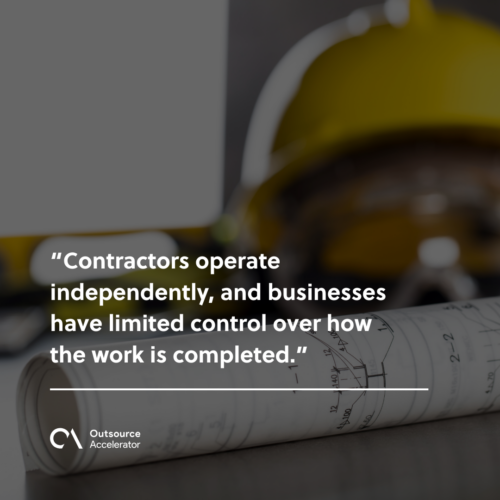10 Pros and cons of working as a contractor

In today’s fast-changing job market, many businesses turn to contract-based hiring to meet specific project needs or fill temporary skill gaps.
Companies often bring in contractual employees when launching new products, expanding into new markets, or tackling short-term goals. These professionals offer specialized expertise without the long-term commitment of a full-time hire.
This trend has become even more common with the rise of remote work, where businesses can tap into global talent pools and scale teams quickly. Working as a contractor offers flexibility and independence, but it also comes with unique challenges that differ from traditional employment.
This article explores the ten pros and cons of working as a contractor, offering a balanced look at the opportunities and trade-offs involved.
Whether you’re considering contract work or looking to hire contractors for your team, understanding both sides of the experience can help you make informed decisions.
Employee vs. Contractor: Understanding the differences
Businesses often work with both employees and independent contractors, but these roles are not interchangeable. Knowing the differences between them helps your organization stay compliant with labor laws and make strategic staffing decisions.

The table below highlights the essential differences between an employee and a contractor:
| Aspect | Employee | Contractor |
| Control | The employer controls work hours, methods, and tasks. | The contractor decides how and when to complete the work. |
| Payment | Paid a regular wage or salary, often with benefits. | Paid per project or on a freelance basis, without benefits. |
| Taxes | The employer withholds income and payroll taxes. | The contractor handles their own taxes and deductions. |
| Tools and equipment | The company typically provides tools and workspace. | The contractor uses their own tools and resources. |
| Job security | Typically, it involves ongoing work and job protections. | Works on a temporary or project basis with no guarantees. |
| Legal status | Considered part of the company under labor laws. | Operates as an independent business entity. |
Having in-depth knowledge of these distinctions helps business owners choose the right type of worker for specific tasks. Misclassifying workers can lead to legal penalties and unexpected costs.
Employers should carefully analyze each working relationship and document terms clearly, particularly when working with contractors, to ensure alignment with legal standards and operational needs.
10 Pros and cons of working as a contractor
Hiring contractors can be an excellent move for companies that need specialized skills, short-term support, or project-based assistance. Contractors offer a flexible solution without the long-term commitment of a full-time employee.
However, like any staffing decision, there are benefits and drawbacks. Understanding the pros and cons of working as a contractor from a business perspective helps in making the right hiring choices:
1. Cost savings on benefits
Businesses are not required to provide health insurance, paid leave, retirement plans, or other employee benefits to contractors. It can lead to significant savings, especially for short-term or specialized roles.
2. Workforce flexibility
Contractors give companies the ability to scale up or down quickly based on workload or project demand. There is no long-term obligation, which allows more control over labor costs.
This agility proves invaluable for businesses treading fluctuating market conditions or seasonal peaks.
3. Access to specialized skills
Contractors often bring deep expertise in specific areas such as IT, design, or engineering. Hiring a contractor gives immediate access to high-level skills without needing to invest in long-term training.
4. Reduced overhead costs
Contractors usually work remotely and use their own tools or equipment. This reduces the need for office space, technology, and other resources typically required for full-time employees.
Businesses save on infrastructure and operational expenses.
5. Faster onboarding and results
Contractors are used to jumping into new environments and delivering quickly. Many are experienced with project-based work, allowing them to get up to speed and produce results faster than new hires.
While there are advantages to hiring contractors, it is also best to know the downsides:
6. Lack of control over the work process
Contractors operate independently, and businesses have limited control over how the work is completed. This can be challenging when a project requires close supervision or consistent team collaboration.

7. Inconsistent availability
Since contractors often work with multiple clients, they may not always be available when needed. Their schedule might not align with internal timelines, causing potential delays.
Inconsistent availability can complicate project management and create workflow bottlenecks.
8. Limited company loyalty
Contractors are typically focused on delivering results, not long-term growth within the company. They may be less invested in company culture or team development, which can impact morale in some environments.
9. Compliance risks
Misclassifying a contractor as an employee can lead to legal and tax consequences. Companies must clearly define the contractor relationship and stay updated on labor laws to avoid compliance issues.
10. Higher hourly or project rates
Although contractors save businesses money on benefits, their hourly or project rates can be higher than those of full-time employees. Over time, this can add up, especially if the contractor is used for ongoing work.
Is working as a contractor a good move for you?
Hiring contractors offers businesses flexibility, access to niche talent, and reduced long-term costs. It’s an effective solution for project-based work or short-term needs. However, it also introduces challenges in terms of control, compliance, and continuity.
Businesses must weigh the pros and cons carefully when considering working as a contractor model. Clear agreements, strong communication, and strategic planning can help make contractor relationships successful and cost-effective.







 Independent
Independent




